Star Trek TOS - Season 1 - Episode 26
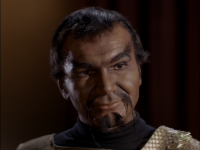
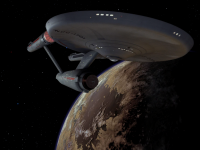
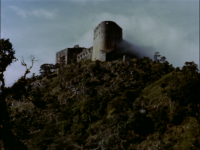
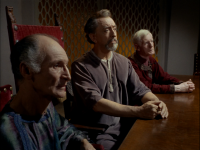
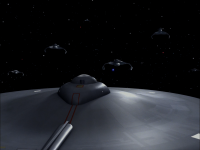
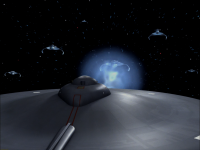
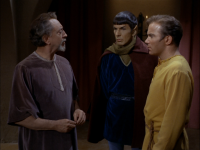
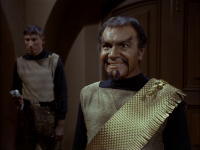
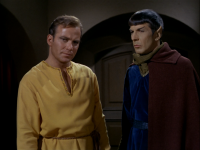
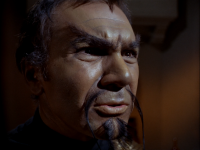
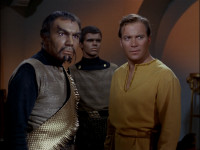
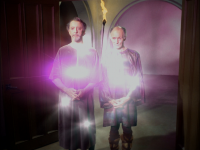
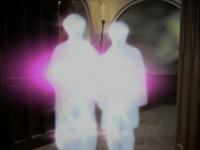
Star Trek TOS - 1x26 - Errand of Mercy
Originally Aired: 1967-3-23
Synopsis:
Kirk and Spock battle Klingons to free Organia. [Blu-ray] [DVD]
Filler Quotient:
0, not filler, do not skip this episode.
- This is the first episode to feature the Klingon Empire.
Problems
- Kor tells Spock, a Vulcan, and Kirk, an Organian (as far as Kor knew at the time) that the mind probe on its highest setting leaves something not at all "human." As far as Kor knew, no one in the room was human. Why would he say that?
- Vulcans are inexplicably referred to as "Vulcanians" in this episode.
Factoids
- Kirk mentions in this episode that the Federation invested a great deal of money in his (and Spock's) training. While the line could merely be hyperbole, it could also indicate that the training of Starfleet officers comes at great cost to whatever resources in the Federation are nonrenewable and thus precious.
Remarkable Scenes
- The Enterprise being attacked by a Klingon ship and destroying it.
- Kirk describing the horrors of the Klingon Empire to the Organians.
- Kor appearing, taking over the planet, and declaring himself governor.
- Spock passing the lie detector even though he was lying.
- Kirk's private discussion with Kor after Kor discovered Kirk's true identity.
- Kirk: "Gentlemen, I have no great love for you, your planet, your culture. Despite that, Mr. Spock and I are going to go out there and quite probably die in an attempt to show you that there are some things worth dying for."
- Kirk: "What would you say the odds are on our getting out of here?" Spock: "Difficult to be precise, captain. I should say approximately 7824.7 to 1." Kirk: "Difficult to be precise? 7824 to 1?" Spock: "7824.7 to 1." Kirk: "That's a pretty close approximation." Spock: "I endeavor to be accurate." Kirk: "You do quite well."
- Kirk, after infiltrating the Klingon base: "Well, what are the odds now?" Spock: "Less than 7000 to 1, captain. It's remarkable we've gotten this far." Kirk: "Less than 7000 to 1. Well, getting better. Getting better."
- The Organians stopping the fight between the Klingons and the Federation.
- Kirk and Kor arguing with each other, justifying their positions for war.
- The Organians telling Kirk and Kor that in the future the Klingons and The Federation would become friends.
- Kor briefly proposing to work together with Kirk to defeat the Organians.
My Review
A proxy war between two large inter-stellar nations which takes place on a (seemingly) backward planet is an intriguing premise for many reasons, not the least of which are the parallels to the many similar proxy fights during the Cold War which doubtlessly inspired this story. It's somewhat annoying that the writers didn't take this opportunity to reuse the excellently characterized Romulan Empire from Balance of Terror, choosing instead to create the never before seen Klingon Empire for this installment's Cold War allegory, but that said, there's no reason why there couldn't be multiple inter-stellar nations battling as cold warriors during Star Trek's 23rd century. Indeed, the Klingon Empire's foreign policy toward the Federation heats up rapidly in this story as after negotiations break down, the Klingons declare war and launch an exciting surprise attack on the Enterprise! Though it wasn't much of an attack. For all that the battle seemed intense at the time, a few (lucky?) shots from Sulu pulverized the surprise Klingon attacker with only trivial damage to the Enterprise.
Thankfully the Klingons are characterized far more successfully the very moment Commander Kor walks onto the screen. The delightful actor John Colicos cultivates an impressive presence for an antagonist not seen since Khan from Space Seed. Kor single handedly exposes us to the Klingon Empire's apparent warrior culture, demonstrating that their ambition for conquest is not merely a means to an end for them, but an end unto itself. This is made most clear when Kor expresses disappointment over his various easy victories in this story, instead preferring a victory that is hard fought and thus, from his perspective, better earned. Even more intriguing is Kor's reverence for the autocracy he lives in. Rather than merely considering it a necessary evil, he instead sees it as the ideal form of government as it rewards the strong at the expense of the weak, an extension of his warrior ideology. This nicely contrasts the crew of the Romulan flagship from Balance of Terror who experienced deep cynicism about their government.
The terrific premise of this story is sullied by a number of imperfections in the story though. For instance, while John Colicos' performance as Kor was excellent, the less said about the other actors playing Klingons the better. Also, why was Sulu placed in command of the Enterprise instead of Scotty? It was established in A Taste of Armageddon that Scotty is the ship's second officer. Was Scotty off the ship at the time? Another wrinkle in the story is the recurrence of the "mysterious aliens slow down the plot" cliche. Once again we have alien guests whose true nature is conspicuously withheld simply to give the plot more time to unfold, as the Organians spend much of the episode saying what basically amounts to, "we have no defenses! Nor do we need them! We're not going to explain why!"
The climax of absurdity here is that their superpowers are revealed about twelve minutes into the story, but Kirk and Spock remain oblivious for a considerable time thereafter despite obvious evidence presenting itself before their eyes. They do wonder how the Organians can know things like the presence of ships in orbit, but do not bother to speculate or consider the possible implications. Though perhaps maybe the reason Kirk and Spock remained so oblivious for so long is because they're soldiers, not diplomats, as Kirk so emphatically stated at one point during the episode. This statement annoyed me because it seems to fly in the face of Star Trek's stated premise which is to peacefully explore the galaxy and to make contact with new civilizations.
Those are minor nitpicks though compared to a few considerably more serious issues with this episode's story. Once again we have an alien race, the Organians, that looks identical to humans and our heroes don't even blink. The profound similarity is even acknowledged in dialog by Kirk and Spock when they admit that Kirk can reasonably pass as an Organian with a mere costume change as if human-looking aliens with no noticeable physical variations are accepted as common throughout the galaxy. If this is indeed the case, I sure would like to know why. Even the Klingons had rather unambitious makeup in this respect. Darker skin and different hair isn't even as creative as the already lazy pointed ears of the Vulcans. As for the Organians, even though it is later established that they could have chosen to appear in any form they wished, the fact that neither Kirk, Spock, nor Kor found the Organians' similarity in appearance to humans conspicuous is most odd. Worse yet, Kirk's orders to establish a base on Organia and share technology with what at the time seemed to be a primitive society would seem to be a blatant violation of the Prime Directive.
But the Organians were indeed more than they appeared to be and while the slow unfolding of this fact by the plot was a bit irritating, it was quite amusing to observe the rather nonchalant way in which they dealt with the invasion of their planet. Perhaps the best part of the story was when the Organians insisted that one day the Klingons and the Federation would become friends and even work together. Given the highly advanced nature of the Organians, we can't simply relegate this statement to the territory of an idle optimistic prediction. On the contrary, they may very well be in a position to know! More importantly though, they may also very well be in a position to influence events in favor of their preferred outcome. They appear to have single handedly stopped the war in this story. Will they prevent further conflict between the Federation and the Klingons?
This question opens up a larger problem that has been slowly climbing its way to the forefront of Star Trek's storytelling which is to what degree do all these god-like aliens actually control the fates of our heroes? Kirk expresses awareness of the conundrum caused by being unambiguously relegated to that of a lesser species in his final lines of the episode when he states that it's unsettling to learn that he and his comrades are not the most powerful beings in the universe. He further expressed dismay that the Organians "rigged the game." Kirk has good reason to express dismay. If the galaxy is truly filled with god-like aliens interfering with the events of the lower planes, then the relevance of our heroes is seriously undermined. At any moment, a deus ex machina can suddenly change the course of their history arbitrarily and for no apparent reason. Let's hope that in the future Star Trek reins in the use of these god-like aliens considerably, or it may become difficult to take the show seriously anymore.

The following are comments submitted by my readers.
But they do have a form of currency in called Federation credits but they don't seem to have any physical money. The various series & movies touched upon that the economics of the Federation are vastly different than the capitalist model. With no hunger, disease or poverty they live in a post scarcity society. Check out the wiki writeup under "Federation credits".
It is still odd that Kirk would refer to efforts expended to train Spock in a monetary sense though.
Kirk is such a fathead in this one. This episode is a prominent example of the differences between Kirk and Picard. I'm not saying one is better than another, but Picard would never have tried to foist his own view of "the way things should be" on an independent world the way Kirk does here. These people don't want his help, because ultimately they don't need it, but that doesn't stop him from forcing himself upon them.
He learns a valuable lesson for his trouble -- things are not always what they appear to be. But he promptly forgets it and goes back to being the same old Kirk for the rest of the series.
The other thing that doesn't click for me is the brain scanner. I guess it's because I'm used to the "non-Soviet" Klingons from TNG and DS9, but this certainly seems more like a Romulan weapon than a Klingon one.
A classic. This is the TOS episode that puts the Klingons in the best light, in the sense of them being worthy enemies of the Federation. I love Kor's combination of ruthlessness and philosophy, and the concept of the wolves among sheep. And the episode has a great sense of wartime excitement. I quite like this episode, even though it does have some weaknesses.
- I agree that it is very odd how Kirk and Spock fail to react to the Organians’ demonstration of knowledge they should not have. The episode would make more sense if they simply couldn’t overhear the weird conversation between the Organians.
- It is funny that the first time I watched the episode, I never really noticed how the attitude of Kirk and Spock towards the Organians after the Klingons arrive is quite irrational. They constantly berate the Organians for not fighting back. Yet the Organians, as far as Kirk and Spock know, have no military and are vastly technologically inferior to the Klingons. The Klingons are totally ruthless, a fact which Kirk himself tells the Organians. They have announced massive retribution for any deaths. Even if the Organians pull off some sort of incredible resistance on the ground, the Klingons can obliterate their society from orbit if they so choose. Obeying the occupation force costs them their freedom but allows their culture to survive. It is understandable that Kirk and Spock would want the Organians to assist them, but it is puzzling that both of them, even Spock, act as though the Organians are fools for not doing so. And blowing up the munitions dump seems like a somewhat callous act, given the likelihood of Klingon reprisal. I assume they justify it by military necessity, and a feeling that life under Klingon rule is worse than death and thus anything the Organians do to increase the chance of Federation victory would be good for them in the long term. Apparently the Prime Directive is so totally overruled in time of war that Kirk feels no need to respect the Organian culture of pacifism and can simply make decisions for them.
- Kor's decision to wait 12 hours before mind-sifting Kirk makes little sense to me. If Kirk is a worthy foe, he will not cave in to Kor’s demands; if he is not worthy, why give him the extra 12 hours? I'm wondering if the Organians are playing with Kor's mind. Or perhaps the success rate of the Mind-Sifter is not really very good; that could explain why it never shows up again. Or perhaps Kor just wanted to see how Kirk would react if given some time to think about his impending horrible demise, just to gauge what kind of man he is and understand the mind of the enemy.
- It is interesting to compare the ruthlessness of Kor to the recharacterized TNG Klingons. The later series spend a lot of time painting the Klingons as a proud, honorable warrior race with a culture that seems strange and violent to the Federation, but is very worthy in its own way. Conveniently, they don’t really mention what happens to the losers when the Klingons actually win a war; the Klingons would seem a lot less like fun, good-hearted frat boys if you knew about the horrors of Klingon occupation, as Kirk describes here. Come to think of it, maybe the Cardassians are the real spiritual successors to Kor’s Klingons.
- I love the Organian gesture of greeting. I should start using that myself.
I think this episode has some strengths. Kor is awesome. Kirk is frustrated into anger, and even Spock accepts the necessity to try to persuade the Organians to fight. I like to see the heroes kicking ass, but really, nobody stops to wonder if there's more going on here than meets the eye? And in another episode, they claim that they can't violate the Prime Directive on pain of death or whatever, but where the heck is it now? Why do they assume that the Organians (as they understand them at this point) haven't thought about the implications of their pacifism? They would rather be conquered than use violence-- their choice. People who are truly committed to pacifism have thought these things through.
But my greatest irritation is with any episode or movie of any kind where a short explanation could resolve the misunderstanding. I realize it would have made the episode about 6 minutes long, but why won't the Organians just say, "Look, we've got some powers you don't know about, and these guys can't hurt us. It's all good." Then maybe showed them that hot-weapons trick or something? A simple misunderstanding just isn't enough to hang a whole plot on.
Strider
‘7’. The Prime Directive obviously does not apply to strategically located Class M planets in key sectors bordering a dangerous enemy. By the time of the NG the Federation is apparently able to allow its enemies all the advantages in battle, and then pull it out at the end with the Boy Wonder and Filter Face issuing some embarrassing technibable while reconfiguring the deflector into a time machine or whatever. (So what are those hippies back at Starfleet design academy doing? Didn’t anyone notice that the deflector array can be changed into a new handy device by a 15 year old marketing device?) Anyways, by NG the Federation might be strong enough to act weakly, but in the original series the Federation clearly has to watch out for the possibility of being conquered, and that must mean the Prime Directive is not universal.
This one looks to be a French resistance story from WW2 crossed over to science fiction. It’s a pity Spock’s interrogation took place off screen; that would have been a strong scene. Spock and Kirk play the role of incompetent British operatives, (Kirk, I’m pretty sure that you should be hiding you Vulcan from the Klingon occupation army rather than parading him around in front of the governor). The Klingons emerge as a solid, well conceived opposition for the Enterprise, but then a promising premise is squandered by yet more advanced entities deciding to finally do their godlike duties in enforcing decent principles and prevent war. Nice, but where have you been for the past 10,000 years and why did you show up just in time to wreck a great ending?
This episode may have contained the single biggest error in judgment pertaining to the longer term survival of the series. If they had let the war just starting play out over the course of following seasons, then the writers would have had a strong ‘fall back’ story arc they could draw upon to replace or pump up future turkeys like ‘The Apple’. Since Organia is a key sector, just have the Organians prevent the war within their area, but what happens further away than that they do not care about. So the war continues, but the logistics of it are difficult for both sides hence it becomes drawn out. Star Trek stories in a war background in science fiction are inherently stronger pieces: Exhibit A, Wrath of Khan. Exhibit B: The Undiscovered Country.
A really strong episode, mainly because of Kor.
Instead of giving us a 1-dimensional "evil invader," the story gives us a fully-developed antagonist who brings out the most aggressive side of Kirk. The characterization of Kor could have been horribly oversimplified, which would have made for an extremely boring episode. As it was, it was one of the best ones that I've watched so far.
I, like Kethinov, grow very tired of unimaginably powerful beings in the series. Sure, the mystery of their true nature lends a certain air of suspense and wonder through most of the episode. But the eventual revelation that they are virtually omnipotent and omniscient is rather dull.
Still, it's good to see that one of the most iconic alien races that Star Trek produced had such a strong introduction.